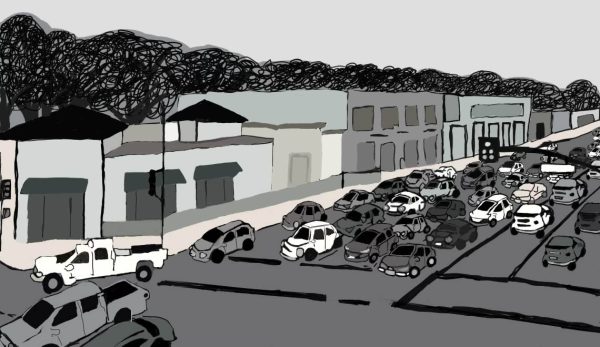Democracy, Claire-ified
September 28, 2022
Former president Franklin D. Roosevelt’s inaugural address was delivered during one of the most tumultuous times in American history. The nation, rocked by the Great Depression and clinging to whatever optimism it could muster, listened as Roosevelt promised the beginning of a new era: “The only thing we have to fear is fear itself.”
At the time, the nation’s troubles were the product of myths turned into reality, of imagined wealth and the market trends associated with it disappearing in front of our eyes. As a country, we had to prove ourselves. We had to prove that we could become confident in our economic systems and unending spirit, our ability to recover and prosper.
Today, our problems reach beyond speculation or economics. Far-right theories about stolen elections have inundated social media sites, impacted mainstream political parties, and crept into high-level conversations about election laws. This misinformation does not just threaten to demolish the foundation of our country and the legacy of its past — it will destroy our nation’s future quickly and irreparably. America’s democratic crisis is not abstract, and its solution cannot come from posturing or political vigor alone. We have far more to fear than fear itself.
False claims of election fraud, the horrifying Capitol insurrection they prompted, and a growing movement to allow legislatures to invalidate millions of votes and overturn elections cannot be attributed to fear. In fact, the opposite is true: Right-wing candidates who believe they can lie to their base and sow political discord by propagating the idea of a “stolen election” have few consequences to be afraid of.
The possibility of these lies contributing to damaging policy actions could be significantly reduced this year with a bill that would reform the Electoral Count Act of 1887. The bill would make subverting or overturning a presidential election far more difficult by requiring that at least one-third of congressmembers sign any objection to certifying presidential electors instead of the single congressmember minimum that is currently required. Governors would have to approve and submit the electors chosen by their state’s popular vote unconditionally, so failure to do so would give campaigns a legal basis to sue.
The bill would also specify what the basis of such an objection might entail, ensuring that only factually-based result disputes could carry weight in government. Lastly, in a provision that seems to directly address Jan. 6 rioters’ calls for former Vice President Mike Pence to overturn the presidential election, the bill would clarify that a vice president’s role in this certification process is ceremonial.
If the reform bill succeeds and passes through the Senate and president, Americans will attain a much-needed peace of mind that, at least within the short term, the nation will continue to function as a representative democracy. In the long term, however, the context looming over such legislation remains concerning.
The bill passed 229-203 in the House of Representatives, and only nine Republicans voted for it. Even more troubling, though, is the fact that all nine of those Republicans are either retiring next year or lost their primary to a right-wing challenger who does not support election reform.
Misinformation campaigns attempting to convince Americans of nonsensical and dangerous claims of a fraudulent election still permeate our country’s media landscape, from Twitter and Reddit to Tucker Carlson’s tirades on Fox News. Our democracy is experiencing a crisis that will expose its ugliest faults and require widespread mobilization and action. We have much to be afraid of, but we also have much to be hopeful about. As the nation’s faults are deepened and exposed, we have the opportunity to reverse the tectonic shifts that created them. From withholding legal legitimacy from conspiracy theorists to supporting media literacy and debate education projects, Americans can address the mistakes of the past and present while securing a fair and peaceful future.
This movement, however, will not succeed in the absence of fear. It will succeed when we recognize that our fear is justified and that we must do everything in our power to resolve it.





































